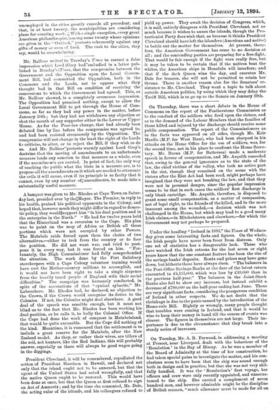Mr. Balfour writes', to Tuesday's Times to correct a false
impression which Lord !Grey had'embodied in a letter pub- lished in Monday's [Times, that the compromise between the Government and the Opposition upon the Local Govern- ment Bill, had committed the Opposition, both in the Commons and the Lords, not to oppose what they thought bad in that Bill on condition of receiving the concessions to which the Government had agreed. This, as Mr. Balfour showed, is a completely erroneous impression. The Opposition had promised nothing, except to allow the Local Government Bill to get through the House of Com- mons, so far as they had any power in the matter, before January 20th; but they had not withdrawn any objection or shut the mouth of any supporter either in the Lower or Upper House. As for the Poor-law change, that had already been debated line by line before the compromise was agreed to, and had been resisted strenuously by the Opposition. The compromise will not change in the least the right of the Lords to criticise, to alter, or to reject the Bill, if they wish to do so. And Mr. Balfour7'protests warmly against Lord Grey's doctrine that the moving of amendments to an unfortunate measure lends any sanction to that measure as a whole, even if the amendments are carried. In point of fact, the only way of teaching the public what the blots in a measure are, is to propose all the amendments on it which are needed to attenuate the evils it will cause, even if its principle is so faulty that it cannot, even by any number of amendments, be made into a substantially useful measure.






































 Previous page
Previous page